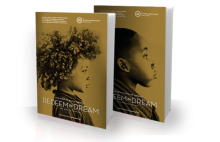As the Urban League’s research arm, the Washington Bureau conducts insightful research on the urban America and other underserved communities and the issues and policies that impact their social and economic status, mobility, prosperity and empowerment. The Washington Bureau is responsible for producing the Urban League’s seminal publication, The State of Black America which provides an annual report card on how far African Americans have come in achieving full equality. Other publications have explored the impact of health disparities in the black community in The State of Urban Health; the impact and importance of the black vote in The Hidden Swing Voters; and looked at the challenges facing black families in the wake of the financial downturn in the country in The State of the Black Middle Class. The Washington Bureau also offers thoughtful policy recommendations and information guides that support our Empowerment Goals in publications such as our 8-Point Plan: Educate, Employ and Empower and A Comprehensive Guide to Child Welfare Reform. As community based organizations, Urban League affiliates are at the heart of a transformation that is taking place around the country on how we respond to children and youth experiencing – or at risk of – abuse or neglect. This is a movement that seeks to change the way services for children and their families are financed – from a system that focuses resources on children who enter foster care to one that looks to the family and community to prevent children from being placed outside their homes or secures a safe, permanent home when a child cannot return to his/her parents. The goal is to align federal financing with these desired outcomes for children and families. The 37th edition of the State of Black America, Redeem the Dream: Jobs Rebuild America commemorates the milestones that have occurred in black history in the 50 years since the height of the civil rights movement. This year’s publication features essays by an esteemed group of thought-leaders from leading corporations, not-for-profit organizations, academia and news media, as well as members of the President’s cabinet and federal lawmakers. Health disparities inflict a significant level of illness, disability, and death on the nation’s racial and ethnic minorities. However, in addition to excess morbidity and mortality, health disparities impose a significant economic burden on society. In 2009, health disparities cost the U.S. economy $82.2 billion in direct health care spending and lost productivity. The 2008 Presidential election was extraordinary for two reasons. First was the election of the nation’s first African-American President. The other remarkable outcome of the 2008 Presidential election was the extraordinary increase in the number of African-Americans who voted. Some 2.4 million more African-Americans voted in 2008 compared to 2004 – this was a 16% increase in African-Americans who voted to bring the total to 16.67 million voters.

A Guide to Comprehensive Child Welfare Reform

State of Black America

The State of Urban Health

The Hidden Swing Voters

